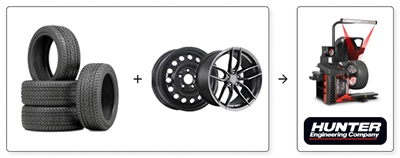What do the letters LT on a tire mean?

The LT designation indicates that the tire is designed and manufactured for use on pickup trucks, SUVs or vans. LT tires are generally more durable and have a higher load capacity than standard passenger car tires, making them suitable for carrying heavy loads or pulling trailers.
The LT designation is usually found on the sidewall of the tire, along with other important information such as tire size, maximum load and speed rating.
Will the LT tire last longer?
LT (Light Truck) tires are generally designed to be more durable and have a higher load capacity than standard passenger car tires. This means that they are built with more robust materials. For example, the sidewalls are reinforced and the treads are stronger, making them more durable.
However, the life of a tire can depend on a variety of factors, such as tire quality, driving conditions and tire maintenance. For example, driving on rough roads, overloading the vehicle or not maintaining proper tire inflation can contribute to faster tire wear, whether it's an LT tire or a passenger car tire.
Why do LT tires have a deeper tread?
LT (Light Truck) tires generally have deeper treads than passenger car tires because they are designed to handle heavier loads and more severe driving conditions. The deeper tread provides better traction and stability, which is especially important when driving on unpaved or uneven surfaces, or when carrying heavy loads.
The deeper tread pattern of LT tires also allows for better water evacuation, which can help prevent hydroplaning and improve wet handling. This is especially important for larger vehicles like trucks and SUVs, which may be more prone to hydroplaning due to their weight and size.
LT tires are designed to be more durable than passenger car tires. The deeper tread of an LT tire means there is more rubber to wear out before the tire needs to be replaced, which can increase the life of the tire and contribute to better value for money.
However, it's important to keep in mind that deeper treads can also mean the tire is more susceptible to heat build-up and may have greater rolling resistance, which can lead to increased fuel consumption.
Why an LT tire?
Ultimately, while an LT tire may be more durable and have a longer lifespan than a passenger car tire, it's important to follow good tire maintenance practices to ensure they last as long as possible. This includes checking tire pressure regularly, rotating tires and avoiding overloading the vehicle beyond the tire's rated capacity.
If you regularly use your vehicle for heavy-duty work or towing, an LT tire may be a good choice to provide the necessary durability and load capacity. Also, if you frequently drive on rough roads or in areas with hazards such as potholes or debris, the thicker, stronger construction of an LT tire can provide better protection against punctures and damage.
However, it's important to keep in mind that LT tires are generally stiffer and can provide a more punishing ride than passenger car tires. They can also be more expensive than passenger tires. It's always a good idea to consider your specific needs and driving conditions when choosing a tire, and to consult a professional at PMCtire.com if you have any questions or concerns.


